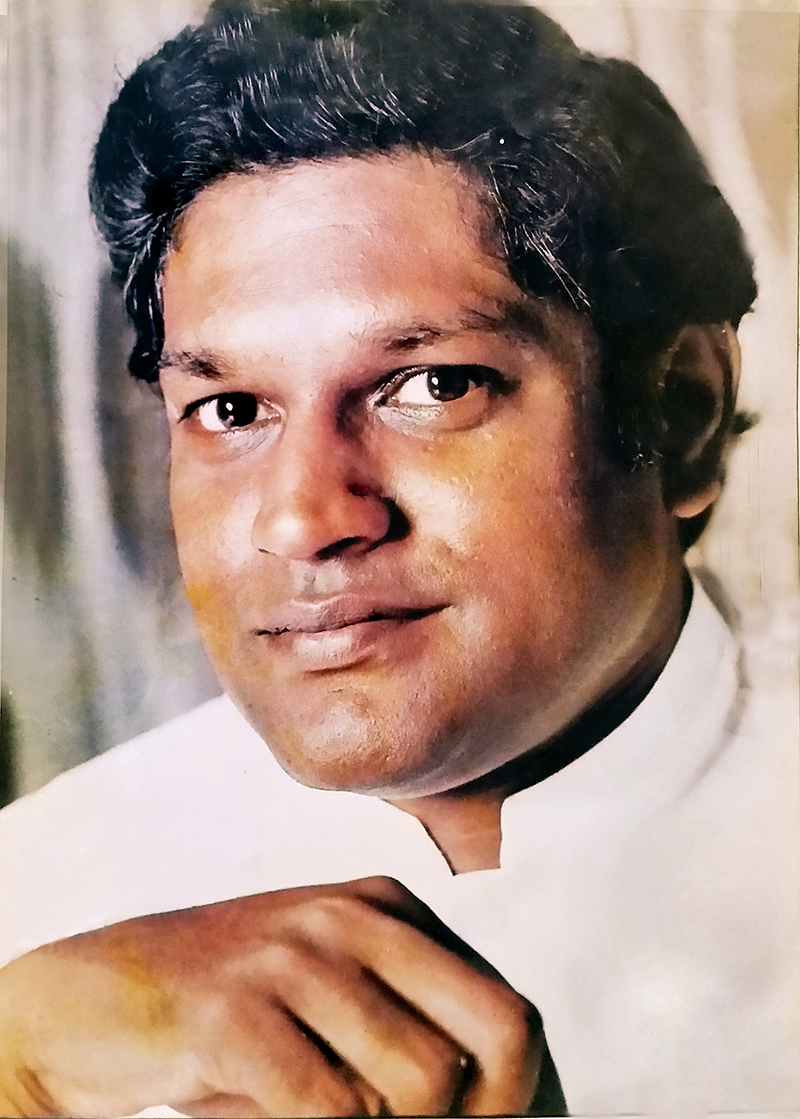BY RANDIMA ATTYGALLE
Upali Wijewardene, could have been a coveted prize for Sri Lanka today more than ever before. At a time when the country is put on a trial like never before, the vision of Upali Wijewardene, – Sri Lanka’s most consummate entrepreneur todate for an economically and a culturally inclusive Sri Lanka, calls for revisiting.
A global Sri Lankan who turned adversity into opportunity; a leader who could nurture talent, applaud imagination and innovation, Upali set his visions high and was not diminished by historic references of what has been done in the past as benchmarks. A larger-than-life figure who carved new paths and futures for Sri Lankans who were therefore in a sense ‘given permission to dream big’, is sadly not given his due place in the contemporary Sri Lankan history. The life of Upali Wijewardene calls for case studies at multiple levels and a public discourse for every Sri Lankan to be inspired by….
On a day like this 40 years ago on February 13, 1983, Sri Lanka’s much loved business magnate who caught the imagination of an entire nation vanished without any trace in his Lear jet with five others on board, on his return to Colombo from Malaysia. Upali was once dubbed ‘the ‘Quintessential Entrepreneur of Asia’ and ‘the man who would become the President.’
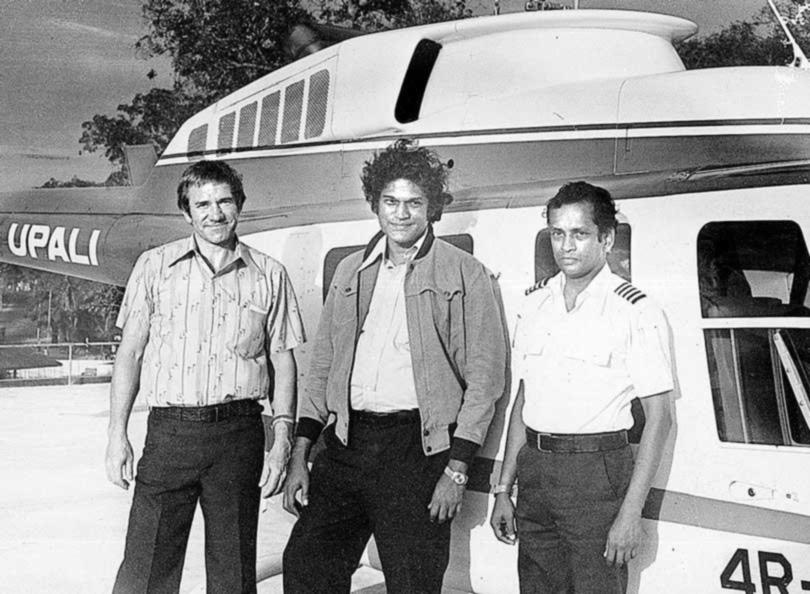
His disappearance engulfed the entire world in shock and disbelief. US Orion surveillance, Soviet and Australian warships, Indonesian minesweepers, Indian airplanes, Malaysian patrol boats and Sri Lankan fishermen were all mobilized in search operations to no avail.
If Upali Wijewardene was a sensation in life he was elevated to a legend after he went missing just four days before his 45th birthday. His disappearance left the nation at large to feed on the wildest theories and fired the imagination of Colombo’s children of the 80s who were said to have devised a game called ‘finding Upali’s plane.’
‘What if Upali lived? What actually happened to Upali? continue to augment the imagination of many even after 40 years since his Lear Jet took off from Kuala-Lampur, never to land at home…
Debonair Upali
“My philosophy is to do what you know how to do strongly and from this I mean you must have the knowledge right all the way through…” reflected Philip Upali Wijewardene or ‘PUW” as he was fondly called, in an interview with the Malaysian Business in December, 1981. In a technologically austere setting long before the digital revolution when a direct international call had to be ‘booked’, Upali Wijewardene plunged into chocolate-making, assembly of cars, newspapers, aviation and so much more. As it was once documented, ‘the success story of Upali, is the story of how small Asian companies can grow into international corporations. It’s a reflection of the coming of age of the entrepreneurial Asian.’
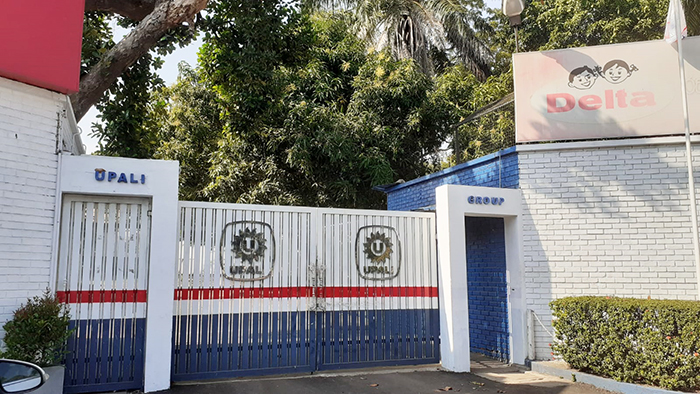
Upali Group Head Office on Bloemendhal Rd
Philip Upali Wijewardene was born on February 17, 1938 to Don Walter Wijewardene and Anula Kalyanawathi Wijesinghe at his famed paternal grandma Helena Wijewardene’s mansion Sri Ramya in Colombo (where the present American Centre stands). Upali grew up amidst the affection of his two older sisters Anoja and Kalyani and a bevy of cousins. He received his kindergarten learning at Ladies’ College and later at Royal College, Colombo. When he turned 15, Upali was sent off to St. John’s School Leatherhead in England. Having read Economics at the University of Cambridge, 21-year-old debonair Upali returned home in 1959 and was recruited by Lever Brothers as a Management Trainee. The corporate rigours and an eternally irate boss left the young recruit drained in two years.
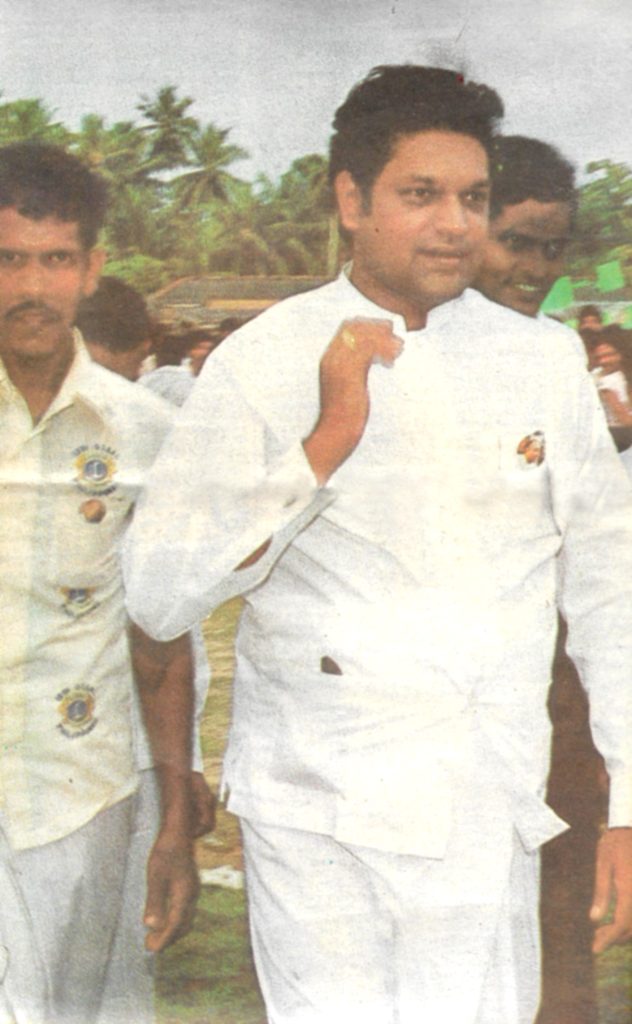
Kandos man
Having quit Levers in 1961, the blue-blooded Upali did not fall back on his family wealth but sought his own fortune first with a friend’s ailing candy confectionery plant which he re-baptized as Delta and a few years later with Kandos– the brand promoted by Ceylon Chocolates Ltd. In 1970 with the demise of the founder Chairman of Ceylon Chocolate Ltd, Senator Sarath Wijesinghe, his nephew Upali Wijewardene who was expanding his business empire took over the reins of the company.
Aligned with Upali’s philosophy: ‘plunge in and get on with it’, the expanding fully-fledged Cocoa processing plants and factories in Malaysia, Singapore and Thailand enabled Kandos to be internationally present and rub shoulders with Nabisco, Mars, Cadburys and Hershey’s. At the time of his disappearance, Wijewardene claimed the only fully-integrated cocoa processor in Asia, from growing cocoa to manufacturing cocoa-based consumer products. The cocoa tree which still adorns the Upali Group’s head office in Colombo and the tall mature cocoa tree which once stood at the doorway to his luxurious residence in Pantai Hills in Kuala Lampur, which he aptly named ‘Cocoa Hill’ speak for his romance with it.
Newspapers- fun project
Following his uncle D.R. Wijewardene, the press baron, he went on to launch The Island and Divaina snubbing the feasibility studies of the foreign experts who warned him that the national newspaper market was already saturated. The exercise, as he alluded to the Insight magazine in May, 1981 five months ahead of its launch, was one of his ‘fun-projects’.
Just two months following the success of the newspaper, in an interview with a Malaysian business journal, Upali gleefully remarked: “it must be a world record of some sort.” He went onto note that the newspaper’s popularity probably has more to do with editorial policy and style, adding tongue-in-cheek: “they said there was no market, but people must have got tired of reading gazettes!” As the founder editor of the Island, Vijitha Yapa once recalled, Upali was “an editor’s ideal publisher who never interfered with the independence of the newspaper.”
A man of energy and affection
Upali is remembered by all who were privileged to associate him as a man with a sense of fun and tremendous energy which he employed in everything he did. In the last lap of his life, not only gave of himself to his many private enterprises but also contributed his time and skill for public purposes; hence his period as Chairman and Director General of the Greater Colombo Economic Commission (GCEC), the predecessor of the Board of Investment (BOI). The emblem of Upali Group- the blazing copper sun with a ‘U’ in the middle, was a symbol of Upali’s own personality. The warmth of his personality, like that of the sun, was felt by the many people he befriended. He was good to his employees, people who served him at various levels, and in return had not only their loyalty but their affection. He was ever conscious that his father died young and he did not expect to attain a venerable old age. At the time his life was so tragically snuffed out, he used to say that the accent is on enjoying, recollect many who knew Upali well.
Horses, thoroughbreds and racing cars
From steering a multinational to being the Chief Basnayake Nilame of the Kelani Raja Maha Vihara, Upali donned many hats. His string of thoroughbreds and Labradors stole a large part of his heart. His beloved ‘Charlie’ is said to have kept his long vigil for months after he disappeared, waiting for his master who never returned.
Upali’s signature facet was his love for speed. This he applied in expanding his business empire. He bought a Lear jet and obtained the Red Passport as the Chairman of GCEC because he was a man for speed and a fast decision-maker. Even his other indulgences including his love for horse and car racing reflected this.
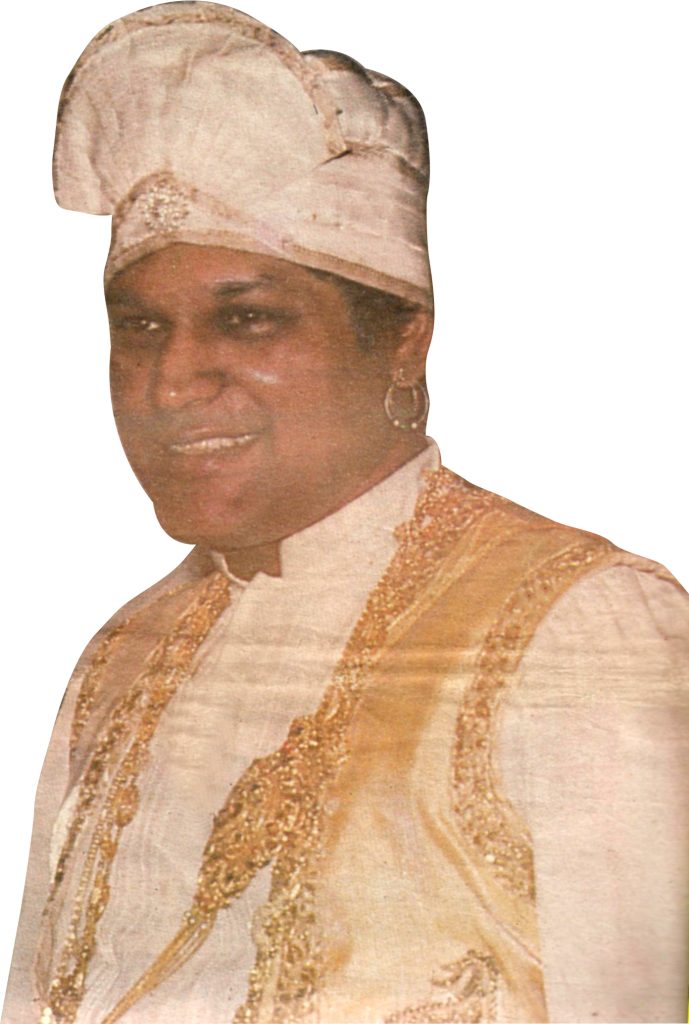
Sporting the famous ‘Red and Gold Cross Slash’, Upali’s Rasa Penang, Varron, Kandos-Man, General Atty, King of Zulu and Cornwall Garden shone at Royal Ascot, Singapore Derby and Perak Derby, ridden by none other than Lester Piggot. One time Chairman of the Board of Stewards of the Sri Lanka Turf Club, he would even do a tarmac transfer to his helicopter and would make it to Nuwara Eliya, sometimes just minutes before races were to start. The luxury S-Class Mercedes Benz 116 which he imported from Malaysia was the first of its kind in Sri Lanka.
A leader of charisma
Despite being a ‘privileged man’ Upali captured the imagination of even the rural village folk transcending class, social status and ethnicity, championing all-encompassing Sri Lankan leadership. The Ruhunu Udanaya Movement he initiated to develop his maternal home town Kamburupitiya and empower the Southern youth for employability is an index to his far-sighted economic vision.
A fan of Victor Ratnayake, C.T.Fernando and Milton Perera, Upali would also go into a reverie to the country-western timbre of Jim Reeves, who as he had once conceded, ‘puts him in a pensive mood for thinking up new business schemes.’
Having built a global corporation which spanned several countries including Malaysia, Singapore and the USA in the 1970s and the early 80s in a technologically-Spartan era of snail mail, telegrams and pre-booked international calls when communicating with overseas people took weeks and travel overseas was expensive and a luxury, Upali’s confidence and ‘can do’ attitude was exceptional. His focus on branding was unmatched. The Free Trade Zones and concepts of similar nature were supported and led by him in view of creating a fresh economic future for Sri Lanka; models which were innovative and leading in those times and have been adopted by several other countries in the region with success.
A man who would be President
A man who would think big, Upali would advance from Upali Fiat and UMC Mazda to ‘Upali Aviation’. The only domestic flight which would bridge the North and the South, the halting of the operations of the Upali Airline was a double whammy to fellow Jaffna countrymen who not only saw the flight as a vehicle of better communication between Jaffna and Colombo but also its founder as a harbinger of hope who would have possibly bridged the economic disparity between the regions.
Describing Upali as ‘Sri Lanka’s most colourful businessman who has made a fortune both at home and abroad’, Matt Miller in his article under the banner ‘The man who would be President’ documents in May, 1981, ‘now he is turning his abundant energies and resources to a new arena; politics.’ Noting that ‘Upali’s current passion for politics is matched only by his passion for racehorses,’ Miller goes onto pen: “And now the 43-year-old commodities wizard has started what could be called Upali’s Third 20-Year-Plan: ‘The first 20 years were education,” he says, “the second business and the third politics.” He would “be willing”, he says with uncharacteristic restraint to become president of Sri Lanka someday.”
Darling of the press
With his suave personality and witty repartee, Upali was a darling of the press. Adorning cover pages of coveted international business journals, he still remains the only home-grown Sri Lankan entrepreneur owning a multi-national to have been featured in the prestigious Fortune magazine.
As veteran journalist Ajith Samaranayake once commented, “politicians Sri Lanka had known before, poets, pundits, scholars, sportsmen, film stars and singers alike. Philip Upali Wijewardene, however, did not belong to any of these moulds. He was not moulded out of the common clay. He broke the mould and reshaped it closer to his heart’s desire.” In Upali’s own words his image in the villages is of “an international businessman of whom they are proud… The villager identifies only with success and for the youth I am probably the culmination of their aspirations.”
I would have loved to have known you
On a personal note, although I was merely a child at the time of Mr. Upali Wijewardene’s untimely departure, I was fortunate to have become a part of the legacy he left behind for Sri Lankan journalism. While Kandos chocolates, Delta toffees, his landmark of a home in Colombo and the resplendent Nuwara Eliya home and its garden- (latter which often clinched the ‘Best Garden’ during the April season) and his infamous Lear jet were motifs I often associated with him as a young child, becoming part of his newspaper allowed me a vantage point to this enigmatic man.
Island in the sun
One of my favourite research subjects, I was often enabled a window to this trendsetter by my senior colleagues during my Sunday Island days. The anecdotes Sunday Island Editor, Manik de Silva, who was Mr. Wijewardene’s first choice to edit his paper (which he often recounts under the title The job I didn’t take up) have been many which I have savoured- particularly the one about young Upali scathingly watching his opponent tilting his soup cup for the last spoonful at the final of Lever Brother’s interview to determine decorum!
My other colleagues at Upali Newspapers who were recruited by Upali Wijewardene more than 40 years ago would often remember him as a man of infectious charisma who would turn heads not just once but twice.
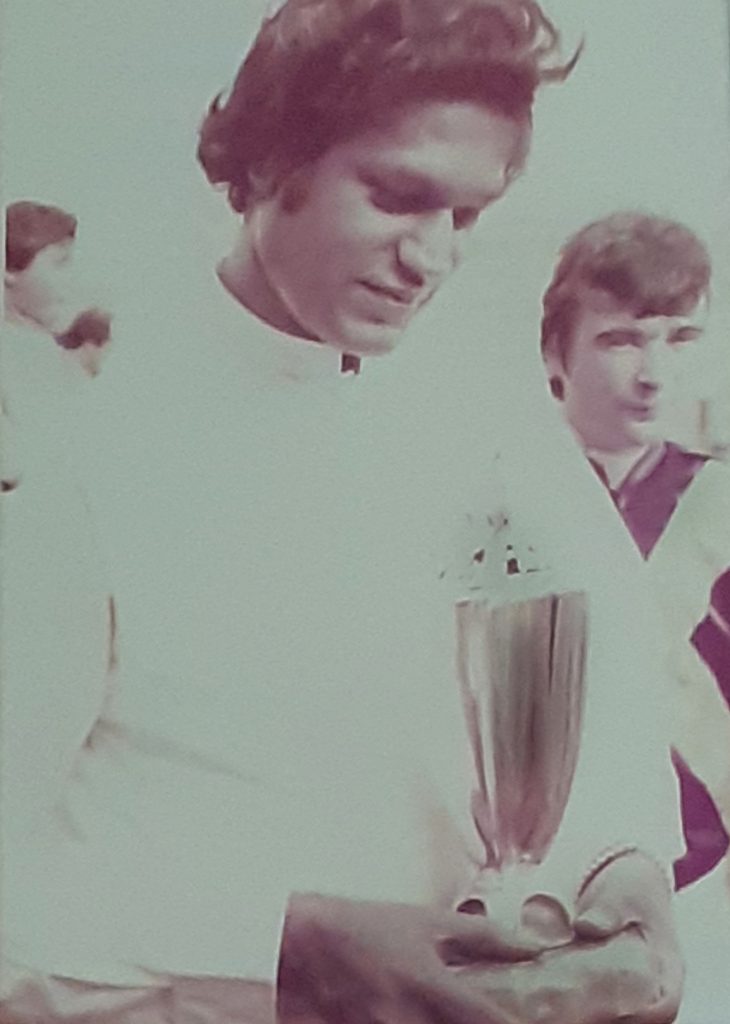
I’m only humbled to have clinched the award given in his honour (Upali Wijewardene Feature Writer of the Year) on multiple times and twice for the very newspaper he championed. I was indeed fortunate to have become part of the publication he realised 40 years ago as a platform of liberal expression where the pen moves in the name of justice and truth and above all in love for this island nation of ours. It was again with this very publication that I spent the most delightful journalistic years of mine. Upali Group enabled me life-time learnings, experiences and some of the best friendships ever. Upali Newspapers will forever remain my ‘ancestral home of journalism’.
Each time I heard the rustle of the cocoa tree he planted in Upali Group premises and looked above the blue skies accentuated by the resplendent dome of the cathedral of St. Lucia’s which towers over, I would often murmur to myself as Elton John sang for Marilyn Monroe, his famous lyrics, Candle in the wind:
‘And I would have liked to have known you
But I was just a kid
Your candle burned out long before
Your legend ever did….’

